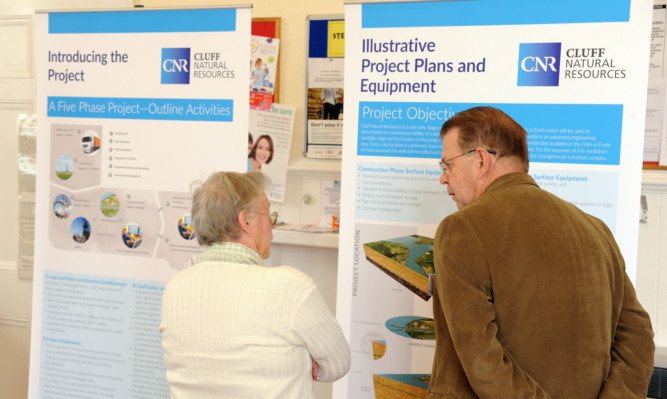Controversial burning of coal under the Firth of Forth at Kincardine would generate £603 million for the economy and over 1000 jobs, it is claimed.
A report commissioned by Cluff Natural Resources states as much as £12.8 billion could be made UK-wide by underground coal gasification (UCG), based on a conservative estimate of eight locations around the country.
And if, as company chairman Algy Cluff intends, UCG begins with a £250m scheme at Kincardine, where a licence already exists, some 45% of the income would be retained in Scotland thanks to ‘first-mover advantage’.
The revelation was made as Fife Council agreed to press Westminster to grant no more licences for UCG in Scotland and the Scottish Government to include the extraction method in its moratorium and review of unconventional gas extraction, including fracking.
Opponents of UCG fear Fife is being used as a guinea pig for the largely untested process which involves drilling a borehole into a coal seam below the sea bed, flushing it with oxygen and igniting it with a burner.
They have warned of environmental disaster if toxic gases leak into Fife’s rising mine water.
Independent economic consultancy Biggar Economics, which conducted the research, concluded the industry had the potential to create up to 11,900 jobs directly and indirectly around the country, nearly 5,000 of them north of the border.
It said UK companies, particularly those based in Scotland, would develop specialist experience in UCG technology which could be exported.
According to the document, building the UK’s first deep offshore UCG project at Kincardine would contribute £603m to the UK economy, 71% retained in Scotland, create up to 830 jobs in creation, average 350 jobs over its 30-year lifetime.
CNR chief executive and chairman Mr Cluff said: “The findings of this report highlight the huge potential of the development of a UCG industry in Scotland and the UK.
“UCG has a vital role to play in the diversification of the UK’s energy mix and security and this report demonstrates how the development of UCG would create significant benefits for both the Scottish and wider UK economy.”
The report said UCG at Kincardine, elsewhere in the Forth area and across the UK would supply domestically-produced gas for a new generation of gas-fired power stations, industrial heat and chemical feedstocks.
Author Graeme Blackett, of Biggar Economics, said: “Scotland is a hydrocarbon and energy-rich country, and this could be an important new industry on a UK-wide basis, supporting many thousands of sustainable jobs.
“Subject to the robust planning and regulatory processes that we rightly have, there are major advantages in being the first movers in this technology, and becoming a world leader,” said Mr Blackett.
CNR recently revealed it would wait until after next year’s Scottish Parliament elections to seek planning consent for its Kincardine project.
Leading the push for a halt on licences and a moratorium, Fife councillor Tom Adams said: “Unless the view is accepted that all fossil fuel development should be phased out, total opposition to underground coal gasification is unreasonable.
“More needs to be understood about the environmental impacts of UCG at the extraction and post-extraction stage.
“The Scottish Government really has to take UCG seriously and include it in the moratorium on unconventional gas extraction.”
Alex Harris, of campaign group Frack Off, said: “Large UCG licences have been issued across the Firth of Forth for this experimental technology which has never been tried offshore anywhere in the world.”
